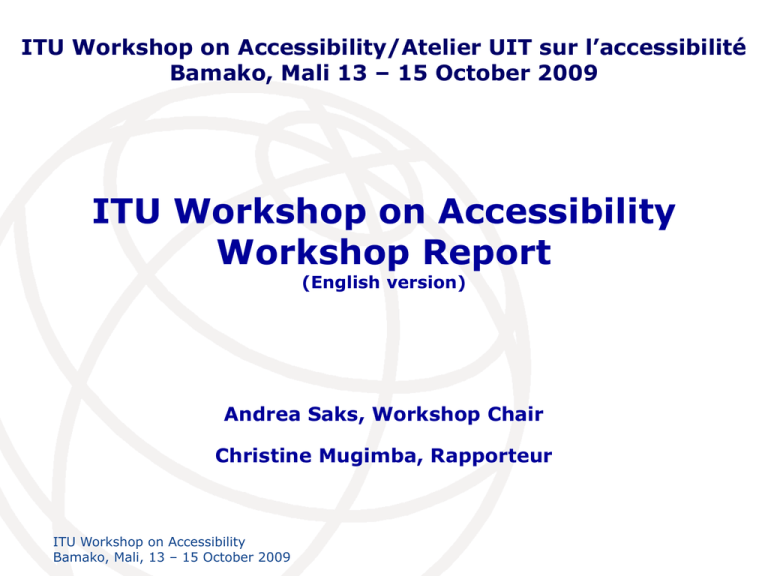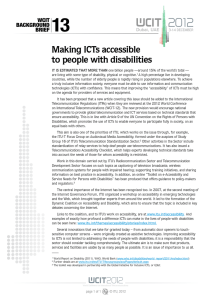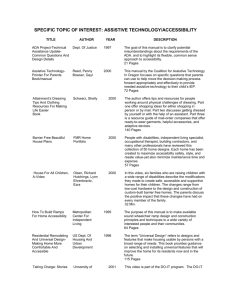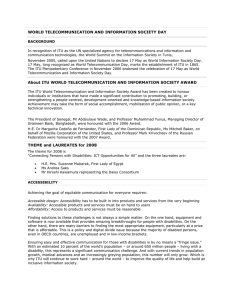ITU Workshop on Accessibility Workshop Report
advertisement

ITU Workshop on Accessibility/Atelier UIT sur l’accessibilité Bamako, Mali 13 – 15 October 2009 ITU Workshop on Accessibility Workshop Report (English version) Andrea Saks, Workshop Chair Christine Mugimba, Rapporteur ITU Workshop on Accessibility Bamako, Mali, 13 – 15 October 2009 International Telecommunication Union Opening ceremony 1/2 Video Opening welcome speech by International Telecommunications Union (ITU) Secretary General Dr. Hamadoun Touré In the presence of H.E. Minister of Communications and New Technologies, Government of Mali, Madame Diarra Mariam Flatie Diallo, H.E. Minister of Social Development, Solidarity and Aged, Mr. Sékou Diakité, Government of Mali Dr. Choguel Kokalla Maiga, Director of Committee of Regulation of Telecommunications (CRT), Government of Mali ITU-T Director, Mr. Malcolm Johnson, Andrea Saks, Convener, ITU-T Joint Coordination Activity on Accessibility and Human Factors, JCA-HF, Abdoulaye Dembele, focal point between ITU-D, ITU-T and JCA-HF for persons with disabilities. ITU Workshop on Accessibility Bamako, Mali, 13 – 15 October 2009 International Telecommunication Union 2 Opening ceremony 2/2 Introductions made by Mr. Oumar Sangho, Journalist in Mali The issues highlighted at the opening ceremony included:Commitment of Mali government to ICTs accessibility issues Event part of the 15th edition of celebrations of the month of solidarity for elderly and persons with disabilities in Mali; Accessibility means autonomy and independence for Persons with disabilities including women and children ITU’s commitment and initiative in Bridging the digital divide in developing countries ICTs help equalise skills Importance of the principles of universal design in standardization work Importance of Adoption of UN convention on rights of Persons with disabilities by UN assembly; ITU Workshop on Accessibility Bamako, Mali, 13 – 15 October 2009 International Telecommunication Union 3 Session 1: Introduction to Accessibility: role of ITU and international organizations ITU-T accessibility activities- Importance of International standards with accessibility features Existing standards such as V.18, Accessibility check lists, IPTV with accessibility features, New standards coming; H.325 and relay services for the deaf World Telecommunications Standardization Assembly (WTSA-08) Resolution 70 standards are voluntary, good business to include all accessibility features at the early stage of design and development: universal design Importance of standards by enabling interoperability; example of the text phones for deaf people that were not compatible country to country Disability communications should be regarded in the same way as rural communications with industry using revenue populations to subside Technology and innovation often ahead of regulation New technology can create barriers; different techniques used in different countries without standards and without universal design ITU Workshop on Accessibility Bamako, Mali, 13 – 15 October 2009 International Telecommunication Union 4 Session 1: ITU accessibility activities ITU-D Special initiative for persons with disabilities; Role is knowledge dissemination in partnership with member states Active participation of member states critical; feedback needed on tools developed Activities include: ICT pilot projects for persons with disabilities in Zambia, Senegal, Burkina Faso, Mali, Malawi New study areas to be tabled at next World Telecommunications Development Conference (WTDC) ITU Workshop on Accessibility Bamako, Mali, 13 – 15 October 2009 International Telecommunication Union 5 Session 1: ITU accessibility activities Political will, ITU decisions or interventions and regulatory measures essential in addressing accessible ICTs Important for persons with disabilities to be actors and not spectators Fellowships available for participation Important to involve universities and R&D institutions Special office created within TSB to implement WTSA-08 Resolution 70 ITU Workshop on Accessibility Bamako, Mali, 13 – 15 October 2009 International Telecommunication Union 6 Issues arising from session 1 Accessibility for persons with hearing impairments Differences in sign language across countries and regions Real time text is important in addressing accessibility of ICTs for persons with disabilities, the elderly and in emergency communications Relay services such as video text and voice should be available for deaf people or people who cannot speak Persons with disabilities concerns and needs Problem is not disability but access to technology persons with disabilities want to use ICTs like other people Need for training of persons with disabilities to be able to use these technologies with the tools that they need Partnership between telecom companies and member states through Ministries is important ITU Workshop on Accessibility Bamako, Mali, 13 – 15 October 2009 International Telecommunication Union 7 Session 2: UN convention of Rights of persons with disabilities and best practices for ICTs Presentations by experts; Importance of UN convention and articles related to accessible ICTs; Legally binding Digital accessibility new basic right Rights related to ICT accessibility now equivalent to rights to access buildings and transport Importance of national laws and focal point for implementation of UN convention accessibility ICTs provisions G3ict tool kit as addressing knowledge and capability building for policy makers Advisory Work of IGF and DCAD and opportunity for participation by ICT experts, persons with disabilities experts and expert organizations ITU Workshop on Accessibility Bamako, Mali, 13 – 15 October 2009 International Telecommunication Union 8 Session 2: technology and disability Research in Latin America on technology and disability by University of Washington, Seattle WA under reporting during census Discrimination and stigmatism Technology is a small piece of the problem. Other problems are social, policy and non technology options such as accessible spaces, the availability of sign language and captioning need to be addressed In some instances assistive devices are not used Social networks, advocacy groups are important and grass root approach is valuable persons with disabilities should be involved at design stage instead of testing stage only ITU Workshop on Accessibility Bamako, Mali, 13 – 15 October 2009 International Telecommunication Union 9 Issues arising out of session 2 Participation Interest by participants to contribute to work of IGF and DCAD; ITU experts may be contacted with details Research and statistics Similar research to that done in Latin America should be carried out but ensuring local capacity building Census and survey questions are critical in getting right statistics on persons with disabilities Advocacy and lobby Need for find approaches to that suit local situation to advocate for rights of persons with disabilities including radical approaches; well organized and lobby activists important Needs of persons with motor disabilities Education and capacity building needed for persons with motor disabilities to be able to utilize existing technologies and to participate in various initiatives User friendly technology for persons with motor disabilities; Friendly technologies (open source software applications in addition to international standards) to persons with disabilities due to leprosy exist, head movement tech. options etc ITU Workshop on Accessibility Bamako, Mali, 13 – 15 October 2009 International Telecommunication Union 10 Session 3: Assistive Technologies for persons with disabilities 1/2 Case studies of Assistive Technologies deployed and used by persons with disabilities by experts Demo by Qualilife AT developed to enable person with severe motor disabilities to communicate using standard technologies; head movement being used to control computer; voice and video calls made over the internet Took 5 years to develop software; No need to reinvent the wheel. This can be avoided by ensuring accessibility features are included at beginning of product cycle ITU Workshop on Accessibility Bamako, Mali, 13 – 15 October 2009 International Telecommunication Union 11 Session 3: Assistive Technologies for persons with disabilities 2/2 Research Center for Advanced Science and Technologies initiatives Concept; device and activity accessibility Focus on difficulty instead of disability; recording device can cover all disabilities using mainstream technologies; mobile phones etc Text instructions better than oral instructions for autistic boy Use of mobile phones as a tool in special education Text book on how mobile phones can be used for persons with disabilities Existing technologies such as Windows OS (supports text to speech engine) already have accessibility features Need for training and information on existing technologies and accessibility features can be explored Development of minority language screen readers project for Nepal ITU Workshop on Accessibility Bamako, Mali, 13 – 15 October 2009 International Telecommunication Union 12 Issues arising out of session 3 Existing technologies and Assistive technologies Assistive technologies have been developed to help persons with disabilities access ICTs, work along side existing technologies Important to have accessibility features at early stage of production of technology Existing technologies can be used as AT; as some of the technologies already have accessibility features Training and information on available technologies and accessibility features important Language diversity in accessible ICTs needs to be addressed Involvement of persons with disabilities in technology development Important to work with persons with disabilities in designing assistive technologies ITU Workshop on Accessibility Bamako, Mali, 13 – 15 October 2009 International Telecommunication Union 13 Session 4: Social and economic issues Factual Information on needs of mentally challenged persons limited; mentally challenged persons usually not included in discussions on persons with disabilities Brain development different and need patience Best people to train are mothers because they are inherently looking for solutions for their children Requirements of children with autism; facts, reduce sensory load, reduce content to essential information Problem is not hardware but the software-SKID software with different modules developed for use by children with autism ITU Workshop on Accessibility Bamako, Mali, 13 – 15 October 2009 International Telecommunication Union 14 Session 4: social and economic issues Concept of accessibility as a pyramid AT or user software at the top; screen readers Applications in the middle; email, word processors Fundamental standards-file, communications and interface protocols Proprietary exclusion: Case study of email application being accessible and not instant messaging Strengths and weaknesses of govt, private companies and civil society in addressing accessibility of ICTs Low cost internet access for persons with disabilities critical because of need for scalability, continuity of availability of technology or solution, affordability issues ITU Workshop on Accessibility Bamako, Mali, 13 – 15 October 2009 International Telecommunication Union 15 Issues arising from session 4 Training needed for persons handling children mentally challenged; with autism, mothers best to train Women with persons with disabilities face greater challenges related to accessing ICTs; 99% of women with persons with disabilities in developing countries. Women are often excluded from education and this compounds the problem Important to have open protocols, international standards and open source within the concept of accessibility pyramid; Solutions that are large scale, can be replicated and adapted to local situations is critical Balance between proprietary standards and open standards There is no need to regulate every facet of accessibility features focus should be on file, compatible accessible communications and international standards with implemented accessibility features ITU Workshop on Accessibility Bamako, Mali, 13 – 15 October 2009 International Telecommunication Union 16 Session 5: Issues regarding e-health, e-education and employment 1/2 Case studies of e-health technological solutions deployed by Qualilife in hospitals and rural communities; voice recognition, touch screens etc. The impact is improved health care and satisfaction by patient Challenge of appreciation and use of ICTs by health experts Capacity building for medical experts needed Localization of solutions important ITU Workshop on Accessibility Bamako, Mali, 13 – 15 October 2009 International Telecommunication Union 17 Session 5: Issues regarding e-health, e-education and employment 2/2 Education and employment challenge for persons with disabilities; no single factor can be applied because includes a series of many issues Better to equip persons with disabilities to develop their own technologies; project on teaching blind programming Multi-sectorial approach/strategy needed; Labor laws and tax incentives Community based health care Shareable training materials Opportunities for persons with disabilities to work through internships Technological options that can be controlled and are free and open source are desirable ITU Workshop on Accessibility Bamako, Mali, 13 – 15 October 2009 International Telecommunication Union 18 Session 6: Sharing best practices for e-accessibility and ICTs Case study from Burkina Faso and Mali Burkina Faso Training centre (AVH and ITU) in adapted computer science to promote professionalism for the blind; equipment like screen readers, scanners and Braille printers 13 trained, 10 completed so far Centre used by neighboring countries Participation in ICT exhibition by blind persons to demonstrate professionalism Mali; training centre funded by UNESCO Norway, role of government, association of persons with disabilities and M&E important ITU Workshop on Accessibility Bamako, Mali, 13 – 15 October 2009 International Telecommunication Union 19 Session 6: sharing best practices for e-accessibility and ICTs Kyrgyzstan; Goal to develop Human Capacity and potential of each country; Digital TV project for children with various needs (education, remote areas, discrimination and disabilities, women being kept at home, children working during the day.)-user interfaces; keyboard, setup box, TV set ITU in collaboration with Ministry of ICT and DIMTV; application of latest technology Set up box software compatible with LINUX or open source Accessibility tool kit for policy makers ITU Workshop on Accessibility Bamako, Mali, 13 – 15 October 2009 International Telecommunication Union 20 Session 6: issues arising Training centre common practice within region Need to train staff in use and maintenance of computer equipment Need for continued research in applicable technologies Need for policy advocacy on issues of standardisation of products and software Need to assess and review impact of such workshops especially regarding knowledge and information dissemination Projects funded by ITU or UN agencies Issues of affordability and scalability for advanced technology projects such as digital TV ITU Workshop on Accessibility Bamako, Mali, 13 – 15 October 2009 International Telecommunication Union 21 Session 7: Experiences and challenges in promoting accessible ICTs 1/2 Panel discussion; Uganda, Mali, Zambia, Gambia, Senegal, Burkina Faso, DRC Congo Issues arising Some countries yet to ratify UN convention on rights of persons with disabilities Projects on ICT accessibility for persons with disabilities implemented with support of ITU-D as pilot projects; Explore use of Universal access funds for sustainability, ITU funding limited Political will important in advancing the needs of persons with disabilities related to persons with disabilities ITU Workshop on Accessibility Bamako, Mali, 13 – 15 October 2009 International Telecommunication Union 22 Session 7: Experiences and challenges in promoting accessible ICTs 2/2 Key stakeholders involved; education, social development and ICT and regulators, associations for persons with disabilities Role of telecommunications companies needs to be emphasized persons with disabilities should be mainstreamed and not necessarily having special initiatives in seclusion Workshop good platform for knowledge sharing and learning Avenues available for participation in work of ITU and DCAD and IGF Exploring increased funding from ITU council for Accessibility projects for developing countries ITU Workshop on Accessibility Bamako, Mali, 13 – 15 October 2009 International Telecommunication Union 23 Session 8: Issuing regarding Training session on ITU toolkit for policy makers 1/5 Raku Raku story; DoCoMo project Market need for elderly and persons with disabilities increase in penetration over 5 year period Statistics from census /surveys Disparity in results due to nature of questions asked during survey, Ask questions on what people can do, capacity to participate in activities and not the disease or disability; South Africa and Tanzania applied activity based methods in collecting stats as recommended by UN. Important to have reliable statistics; Apply UN recommendations for best methods of collecting statistics but applied to your local situation ITU Workshop on Accessibility Bamako, Mali, 13 – 15 October 2009 International Telecommunication Union 24 Session 8: Issuing regarding Training session on ITU toolkit for policy makers 2/5 Business case study of window users in USA who use accessibility features Good for marketing and competitiveness Basic need to understand needs of population including need of persons with disabilities and therefore should be addressed Role of disabled people in policy making Participation of disabled people basic principle of convention and critical Important to fund associations of persons with disabilities in order to effectively participate Businesses should not view support for persons with disabilities as charity but as basic need and right Examples of initiatives; online book project by persons with disabilities for persons with disabilities; book share.org, TifloLibros, AT&T has special council of persons with disabilities contributing to product development within the company ITU Workshop on Accessibility Bamako, Mali, 13 – 15 October 2009 International Telecommunication Union 25 Session 8: Issuing regarding Training session on ITU toolkit for policy makers 3/5 Setting priorities; many government institutions concerned due to the diversity of issues concerned; ICT, socio economic issues, human rights etc Ownership of programs; at minimum have good coordination at ministerial level; that is inter ministerial coordination Standards important to effectively used limited resources Regulatory authorities because of understanding of standardization good position to play a big role in setting priorities ITU Workshop on Accessibility Bamako, Mali, 13 – 15 October 2009 International Telecommunication Union 26 Session 8: Issuing regarding Training session on ITU toolkit for policy makers 4/5 Policy implementation tools; awareness, voluntary charters, legislation and regulation, public procurement; Legislative/regulation approach necessary sometimes for businesses to implement accessibility features Public procurement – Government should not spend tax payers' money on projects, products and services that are not accessible; Imposing procurement of accessible products increases level of production of accessible products and skills of eaccessibility ITU Workshop on Accessibility Bamako, Mali, 13 – 15 October 2009 International Telecommunication Union 27 Session 8: Issuing regarding Training session on ITU toolkit for policy makers 5/5 Funding; inclusion of accessibility features can be at no cost but in some instances additional costs are incurred The avenues of funding; Government budgets, Universal Access and Disability funds, Civil society Operators can agree on specific requirements ; no technical obstacle for using mobile devices with accessible features Persons with disabilities need to be involved in determining accessibility criteria. Consultative advisory committees can be instituted to address needs of persons with disabilities There are a number of criteria and case studies of implementation of accessibility features for wireless services, TV broadcasting , e-government websites, community centres that can be adapted for local situations Different regulators for broadcasting and telecommunications sectors, presents challenge in implementing cross cutting ICT accessibility features; Regulators should share knowledge of criteria of digital accessibility applicable to their situations at regional level Policies country per country and level of implementation of UN convention to be included on the tool Kit ITU Workshop on Accessibility Bamako, Mali, 13 – 15 October 2009 International Telecommunication Union 28 Session 8: Conclusions 1/2 Good statistics important to develop good policies Participation of persons with disabilities in all processes for policy making important; nothing about us without us Proper funding for organizations for persons with disabilities important Each country to set priorities related to making ICTs accessible in line with basic criteria for implementation of accessible ICTs ITU Workshop on Accessibility Bamako, Mali, 13 – 15 October 2009 International Telecommunication Union 29 Session 8: Conclusions 2/2 Policies should be inclusive for successful implementation Tools to be used in implementing accessible ICTs; easiest tool change of behavior Programs to implement should be agreed by all stakeholders Collaboration and partnerships key in addressing accessible ICTs ITU Workshop on Accessibility Bamako, Mali, 13 – 15 October 2009 International Telecommunication Union 30



